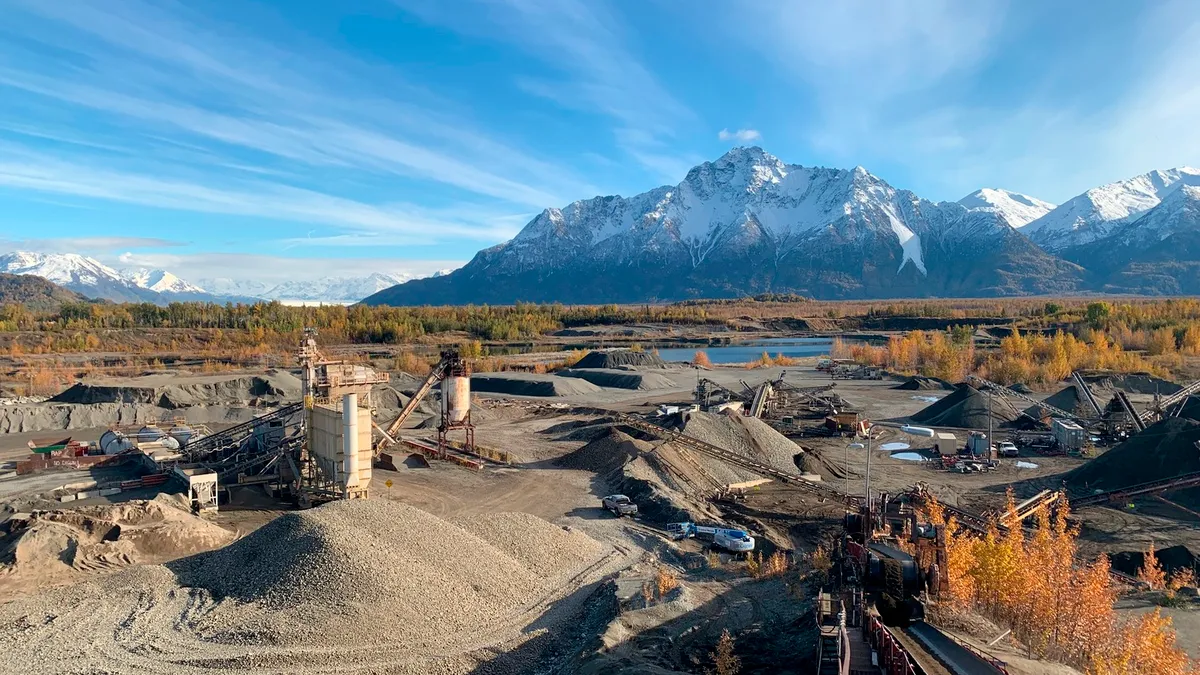Dive Brief:
- Infrastructure builder and materials producer Granite Construction saw its profits and revenue sink in the third quarter as it works through less profitable projects, but this work is almost complete, the company’s president said in a Q3 earnings call Thursday.
- The Watsonville, California-based contractor posted revenue of $1.01 billion, down 4.7% from last year. That still beat analysts’ expectations by $26.34 million, according to SeekingAlpha, as did its non-GAAP earnings per share of $1.41, which beat by $0.47. The company’s gross profits in Q3 stood at $120 million, up less than a percentage point from the year-ago period.
- The company’s backlog, which it calls committed and awarded projects, stands at $4.1 billion. That’s down 3.2% from last quarter in what is traditionally its busiest time of the year, and is 5.8% lower year over year. President and CEO Kyle Larkin said this reflects Granite’s efforts to de-risk its portfolio and turn to smaller and potentially more profitable projects, and added, “We feel really good about the CAP we have today.”
Dive Insight:
Granite has made progress in eliminating its group of less profitable projects, as it executes its strategy to move away from sprawling design-build contracts toward simpler projects in its target markets of California, Utah and Arizona. Unfortunately, challenges and delays on one East Coast project in particular, which represents more than half of the remaining old risk work, lowered the company’s results this quarter, according to Larkin.
However, the CEO said he expects to wrap these less profitable projects by early 2023.
“We cannot finish this work soon enough. I’m excited to see that the end is in sight for the challenging [old risk portfolio],” Larkin said. “Outside of the ORP, I’m pleased with the progress across the company…Granite is better positioned to take advantage of the opportunities ahead of us than the company has been in many years.”
The company’s long-term debt fell to $286.9 million, down from $331.2 million a year ago.
The strategic shifts are part of an ongoing effort to put the company back on track after financial missteps. Since an accounting scandal in its heavy civil group in 2019, Granite has had to restate three years of its financial results. In August, it agreed to pay the Securities and Exchange Commission $12 million to settle charges related to financial reporting fraud.
Granite planned to sell off its water resources and mineral services businesses, but reversed course in September after market conditions worsened. In the call, Larkin said that both businesses have been performing well and look set to continue, and the company intends to invest in them.
Looking ahead
Moving forward, Granite plans to invest in automation, materials reserves and other strategic assets, Chief Financial Officer Lisa Curtis said on the call. The company is focused on its vertically integrated businesses and its materials operations.
Funding from the Infrastructure Investment and Jobs Act is taking longer to turn into lettings than originally anticipated, according to Larkin, but he does expect the law to translate into new business starting in 2023.
“State DOTs are still working through the process of prioritizing and advertising the projects. We expect a ramp-up of opportunities over a period of several years, similar to what we experienced in California when SB1 was first passed,” Larkin said. “We hope to see more meaningful impact on project opportunities over the next six to nine months.”
The company adjusted its 202 guidance slightly, raising its anticipated revenue to a range of $3.2 billion to $3.3 billion from a consensus of $3.05 billion, and increasing its adjusted EBITDA margin guidance for the year to 6%-7% from 5.5%-6.5% last quarter. It also expects an EBITDA of at least 8% by mid-year 2023.
Granite stock prices rose Thursday to $31.51 as of mid-afternoon, up from $28.08 at market close Wednesday.












